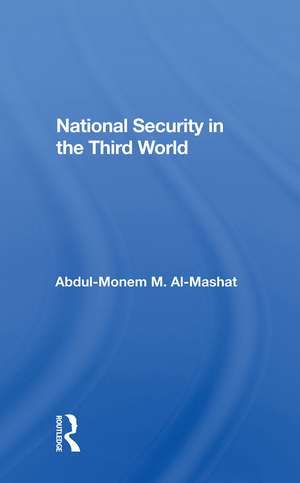National Security In The Third World
Autor Abdul-Monem M. Al-Mashaten Limba Engleză Hardback – 7 iun 2019
Preț: 764.20 lei
Preț vechi: 1027.40 lei
-26% Nou
Puncte Express: 1146
Preț estimativ în valută:
146.23€ • 152.38$ • 121.08£
146.23€ • 152.38$ • 121.08£
Carte tipărită la comandă
Livrare economică 03-17 aprilie
Preluare comenzi: 021 569.72.76
Specificații
ISBN-13: 9780367017224
ISBN-10: 0367017229
Pagini: 138
Dimensiuni: 137 x 219 mm
Greutate: 0.45 kg
Ediția:1
Editura: Taylor & Francis
Colecția Routledge
Locul publicării:Oxford, United Kingdom
ISBN-10: 0367017229
Pagini: 138
Dimensiuni: 137 x 219 mm
Greutate: 0.45 kg
Ediția:1
Editura: Taylor & Francis
Colecția Routledge
Locul publicării:Oxford, United Kingdom
Cuprins
Westview Replica Editions -- Foreword -- Introduction -- The Dilemma of National Security in the Third World: The Need for a Cooperative Environment -- National Security: From Strategic to Nonstrategic Conception -- Domestic Cohesion and International Cooperation: Basic Prerequisites for National Security in the Developing Countries -- Tranquility Index: A Measure of National Security in the Third World -- Epilogue -- Appendix A: List of Actors (N = 95) -- Appendix B: COPDAB Domestic Scale -- Appendix C: COPDAB International Scale -- Appendix D: Description of COPDAB -- Appendix E: COPDAB Dimensions of Interaction
Descriere
For nations of the Third World, national security poses serious dilemmas. Unlike Western nations, less developed countries must balance the complex and often contradictory requirements of socioeconomic and political development with problems of internal stability and the requirements of national defense. For these countries, a concept of national security that focuses primarily on the international threat system and its overt manifestations of wars and violence, ignoring domestic well-being, is inadequate on theoretical and pragmatic grounds. This book addresses the security problems of Third World states, arguing for new ways to define and measure national security so that the concept may be appropriately applied to the needs of developing countries. In addition, the author argues that the "tranquility" of a state, a concept traditionally linked with national security, cannot necessarily be associated with quality of life as measured by conventional means. Dr. AI-Mashat constructs a tranquility index for ninety-five developing nations and tests its relationship with the physical quality-of-life index to demonstrate this point. Attempts to improve quality of life, he suggests, may in many countries lead to a reduction in security unless simultaneous attempts are made to democratize the regime.
